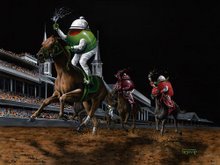“Just Hitting
Another Brick
Wall”

LESSONS IN CIVICS &
THE CONSTITUTION – F

Through the following sequence of events, beginning with the Declaration of Independence on July 4th 1776, I will show you how our courts have been converted to courts of Admiralty that have no jurisdiction to hear Common Law (Bill of Rights) issues brought before them.
These events are, as follows:
A.) Declaration of
B.)
C.) Judiciary Act {1789}
D.) George Rapp Harmony Society {1805}
E.) DeLovio v Boit {1815}
F.) Dr. List’s Letters {1825}
G.) Swift v Tyson {1842}
H.) Limited Liability Act {1851}
I.) Tontine Insurance {1868}
J.) Federal Reserve Act {1913}
K.) House Joint Resolution 192 {1933}
L.) Eire Railroad v Thompkins {1938}
M.) Victory Tax {1942}
N.)
O.) McCarren Act {1945}
What I intend to prove through facts is that:
a.) The Declaration of
b.) The primary and compelling reason for the Declaration of Independence was to eliminate Admiralty Law and Admiralty jurisdiction from the Domestic Law of the colonies.
c.) That the Judiciary Act of 1879 clearly recognized a distinct and separate jurisdiction of Admiralty Law from that of Domestic Law [Common Law].
d.) That the formula and the blueprint of the Federal reserve System* is identical in its essential features, to that of the George Rapp Harmony Society; and to the Tontine Insurance schemes [which are pure wagering policies; and, are specifically forbidden in the constitutions of several states].
*Not to mention that the Federal Reserve System is in and of itself totally illegal, both in its Constitutionality and in the way it was instituted in to the Constitution.
e.) That the Federal Reserve is a maritime lender and insurance underwriter to the
f.) That the subject matter insured by the Federal Reserve is the Public National Credit System, which is a maritime venture for profit under limited liability for payment of debt.
g.) That for the privilege of limited liability for payment of debt, anyone who benefits from the Public National Credit [provided by the Federal Reserve] has an insurable interest in a maritime voyage – and is therefore subject to, and can be required to, make premium payments under the Law of Admiralty and Maritime [the income tax] – as long as the contract is in force.
h.) That all of the resources of the
i.) The House Joint Resolution 192, passed by Congress on
j.) Due to the House Joint Resolution 192, we have lost access to substantive Common Law, we have lost our allodial land titles – and a foreign jurisdiction of Admiralty law has been imposed upon our domestic law – just as took place over two hundred years ago
Declaration of
There were many reasons which impelled the American colonists to separate themselves from
The purpose of the declaration was to assume among the powers of the Earth, the separate and equal station to which the Laws of Nature and the Laws of God entitle them to declare the causes which compel them to the separation. For the purpose of this lesson, I will focus in on the 13th Count where it is stated that He [king George] has combined with others to subjugate the colonists to a jurisdiction foreign to their constitution and unacknowledged by the laws of the colonies. The Declaration then goes on to define the foreign jurisdiction as follows:
+ For quartering large bodies of armed troops among us:
+ For protecting, by mock trial, from punishment for any murders which they should commit on the inhabitants of these states:
+ For cutting off our trade with all parts of the world:
+ For imposing taxes upon us without our consent:
+ For depriving us, in many cases, of the benefit of trial by jury:
+ For abolishing the free system of English laws, in our neighboring province, establishing therein an arbitrary government, and enlarging its boundaries so as to render it at once an example and fit instrument for introducing the same absolute rule into these colonies:
+ For taking away our charters, abolishing our most valuable laws and altering fundamentally the forms of our governments:
+ For suspending our own Legislatures, and declaring themselves invested with power to legislate for us in all cases whatsoever.
So what was this jurisdiction foreign to their constitution? Each and every itemized complaint in the 13th count falls under the jurisdiction of Admiralty Law and the Law of Nations. Even though the colonists were British subjects, they were being treated as if they were a conquered nation – such treatment being sanctioned in one jurisdiction only – that is the Law of Admiralty, plain and simple.
The Declaration further states that as United Colonies “as Free and Independent States, they have the full power to levy war, conclude peace, contract alliances, establish commerce, and to do all other acts and things which independent states, may of right do.”
Therefore, upon signing the Declaration, they were openly declaring to all the nations of the world that they were of equal status and that thereby they were bound by the Law of Nations when dealing with other nations. The Declaration also clearly set forth the colonist’s intention to ban the Admiralty Jurisdiction from within State borders, and from the domestic law of the states. This was the main reason for the separation from the British Crown.
This act also broke the hold of English Feudalism over colonial land and instantly converted all land title to allodiums (Freehold estate; land which is the absolute property of the owner; real estate held in absolute independence, without being subject to any rent, service, or acknowledgement to a superior. It is thus opposed to feud). This fact was clearly analyzed by the Supreme Court of the State of Pennsylvania in the case of Wallace V. Harmstead in 1863, when the court said: “I see no way of solving this question, except by determining whether our Pennsylvania titles are allodial or feudal.—“ “I venture to suggest that much of the confusion of ideas that prevails on this subject has come from our retaining, since the American revolution, the feudal nomenclature of estates and tenures, as fee, freehold, heirs, feoffment, and the like.”
So, the question comes down to: is fealty any part of our land tenures? What Pennsylvanian ever received his lands by publicly and humbly kneeling before his lord, being ungirt, uncovered, and holding up his hands both together between those of the lord, who sat before him, and there professing that he did become his man from that day forth, for life and limb, and certainly honor, and then receiving a kiss from his lord? This was the oath of fealty, which according to Sir Martin Wright, the essential feudal bond so necessary to the very notion of a feud. “We are then to regard the Revolution and these acts of Assembly as emancipating every acre of soil of
Next Week – July 3rd:

















|